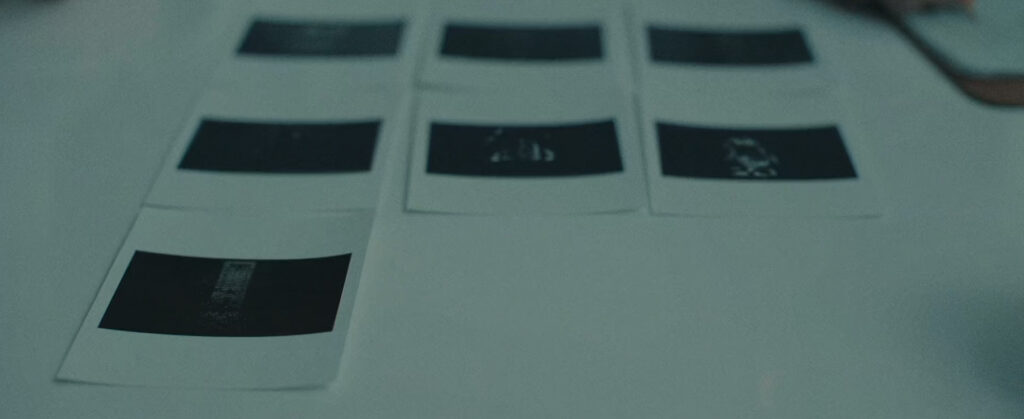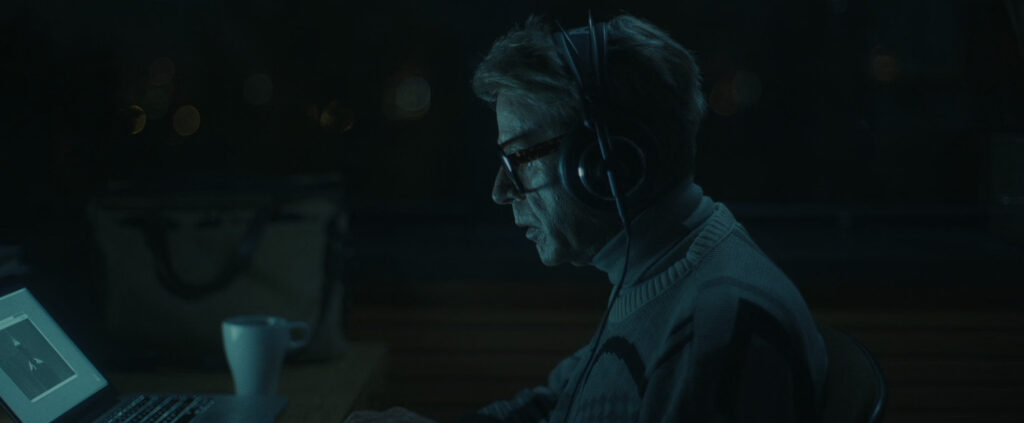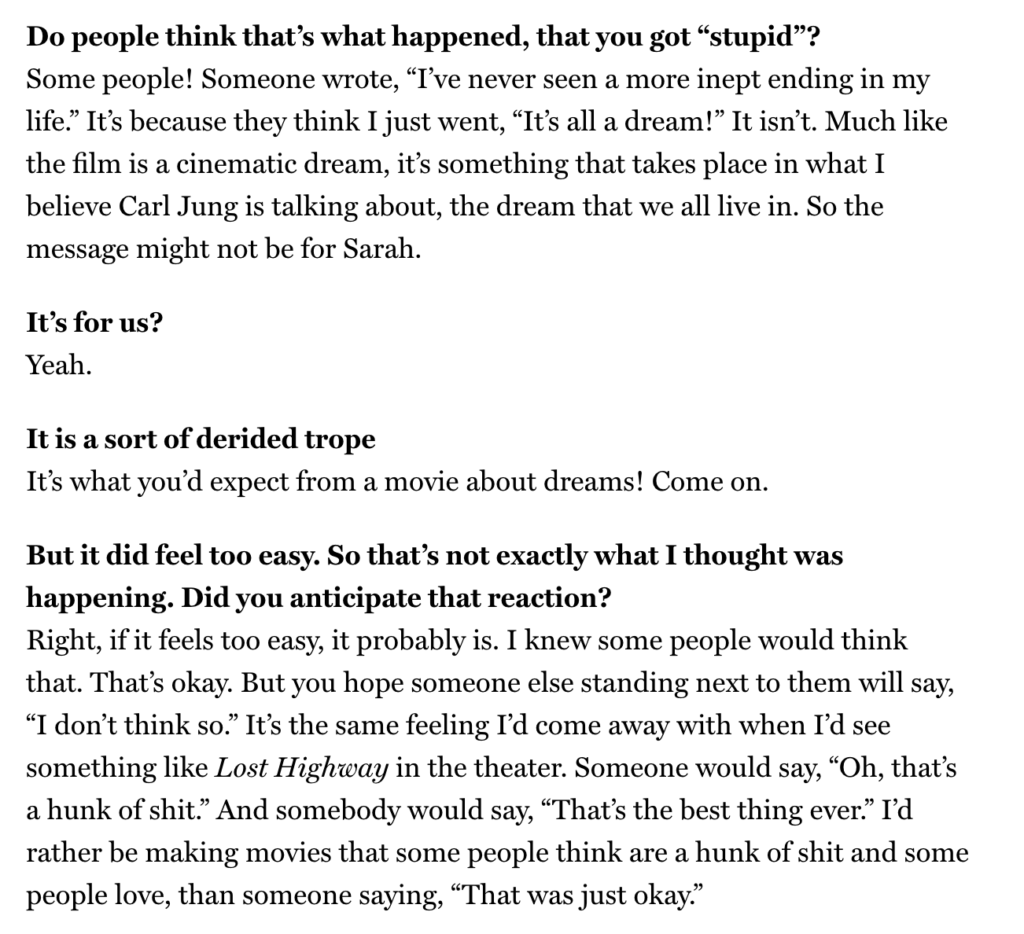Come True Mind Job Movie Recommendation and Walkthrough. Nancy! Thanks for bringing this one to our attention out on Discord. It’s really rare that I stumble out of a movie wondering which way is up. But Come True did that to me in the best possible way. AND THEN, after reading more from the writer/director Anthony Scott Burns, it happened ALL OVER AGAIN. Why? Because the mindjob ending wasn’t meant for Sarah, the protagonist, it might have been meant for me? I am still spinning to be completely frank. But that’s what we do here at THiNC., we find the craziest mindjobs possible… and dissect them, pull them apart, and tease meanings and understandings out from them. Well, hopefully anyway. That’s the goal. So yeah – check out the movie, right here. And then come back and join us as we pull our psyche’s apart in order to try and understand where this movie was going.
If you are still not convinced. Please know I’ve just removed you from my will. No, seriously, this movie is awesome. It’s more an emotional, suprasubliminal, sort of experience, than it is a movie per se. No. That isn’t right, because it’s a full-on movie. But it’s a movie that will make you think, wait, what? What is going on here? Think Flatliners and Upstream Color meets Twin Peaks? Or X-files meets Flatliners meets Monsters? Or maybe better yet? We’ve Forgotten More Than We Ever Knew? Please tell me you know these movies. If not, that’s okay, I just made your weekend. If you still aren’t convinced, spin down through this post, and look at the brilliance of these screen captures. This is the sort of design aesthetic I’m talking about. Glorious, atonal, 80’s, sort of vibe craziness here. It’s glorious. So, go, rent it. Watch it.

Come True Walkthrough
1. Persona –
Sarah Dunne (pronounced done… get it? OK just wait) wakes after sleeping the night on a slide in a playground. She’s not sleeping well. She’s evading her mother, only slipping into the house when her mother leaves for work. When her mother calls, she never answers… not once throughout the entirety of the movie. And while this aspect of her life is the least fleshed out, it is literally the most important. Later on, Sarah stays at a friends house – and is grateful for a bed. While she is there – she has lots of stylistic dreams, dark forms, shadow men.

2. The Anima and the Animus –
(Anima definition: 2. HISTORICAL•PHILOSOPHY – the soul, especially the irrational part of the soul as distinguished from the rational mind. Animus definition: 1. hostility or ill feeling. 2. motivation to do something.)
After Sarah’s first good night of sleep in the study, the technicians take her sleep data to Dr. Meyer, excited about something that they see. Later, Sarah notices a guy sort of creeping on her at a book store, and then later again at a movie. Did you notice the book she pulled from the shelf? It’s a Philip K. Dick book with only the first word of the title visible: “We.” Okay, internet sleuths, what book is that? That’s right – it’s “We Can Remember It for You Wholesale”… which, you probably already know, was adapted into the wicked cool Awhnald movie “Total Recall.” Which should be a huge hint that the entire movie that we are watching is false in some way, shape, or form.
After the next night at the dream study, the techs bring her photos to see if she can identify any of them. When they show her the last one she flips completely out. Goes into convulsions. Later, at the laundromat, she passes out, and is awakened by someone telling her that some kids had stolen her phone. Later that night, before the sleep study starts again, Sarah tells Jeremy (the stalker scientist) that she isn’t going back in until someone tells her what they are doing. Which is, that they are watching the sleeper’s dreams. One of my favorite lines from the entire movie: “These, are hypnogogic experiences, it’s the brain trying to make sense of the reduced inputs it is receiving as he loses consciousness.” Come on, Anthony Scott Burns gets +200 points for seamlessly dropping the word “Hypnogogic” in a screenplay with nary a hiccup.

3. The Shadow –
After agreeing to go back into the study, she convulses in her dream, wakes, and runs. Jeremy chases after her, and eventually spots her going into a club. Meanwhile, in the dream study, we learn that people’s dream states start to synchronize over time. (I was like, REALLY? Pulled out like a billion research papers on sleep… nothing! What is going on here?) And a recurring theme of these symbols synchronized dreams is that of this same shadow character. The two men in the study are paralyzed in their sleep while staring at the shadow that is in their room with them. Meanwhile-meanwhile, Jeremy finds Sarah passed out in a club bathroom, and he carries her back to his house.

4. The Self –
Sarah wakes and find Jeremy asleep in the next room with the same sleep study apparatus on. Which allows her to watch his dream – which was of Sarah. He wakes and they go out for coffee – have sex – and meanwhile – Sarah notices a dark shadow over his shoulder, and she passes out, becomes totally unresponsive. Jeremy freaks out, calls for an ambulance, which takes her to the hospital, but he falls asleep next to her bed, and when he wakes, she’s gone. He follows her out to a field – Jeremy calls for one of his co-workers to come and help. They watch her dream as she sleepwalks her way along. Jeremy finds her phone in the field – when he answers it she screams and wakes up. They start to see the shadows with eyes in the trees – and run for it, but all three are scooped up by the shadows one by one.
Then Sarah wakes on Jeremy’s couch, and she is on top of his lifeless body. She has apparently shoved her fingers through his eye sockets and killed him. She walks into the bathroom and notices that she has vampiric teeth. Her phone buzzes, and an image is being downloaded. That says, and I quote:
“If you’re reading this you’ve been in a coma for almost 20 years.
“We are trying a new technique.
“We don’t know where this message will end up in your dream.
“Please wake up.”
Wait, WHAT?
And so I’ve got good news for you, and some bad news. First, the good news. I think the surface level explanation of this movie is really easy to understand. Which is, that Sarah, the entirety of the movie, was in a coma. Literally, from the first moment we see her, all the way through to the end. We get zero insight into reality. With the exception of the message at the end, and maybe one or two of the phone calls that glitch Sarah out. Otherwise, nothing. Maybe we have a few metaphors, or glimpses, into her life from her evasion of her mother. Maybe just a subtle glimpse of a perverted skew of her time in high school? But really nothing we can grab onto. Is her hospital stay bleeding through to her mind? And the tests and the procedures to try and wake her up… are they all manifesting in this dream study she is participating in? Possibly. Be we can’t know that definitively. So, yeah, that is the simple view of this particular movie. Sarah had some sort of an accident, and has spent the past 20 years in a coma.

Here’s the bad news. There are some of you out there (cough, Chris, cough Adam, cough Roberto… you guys know who you are) that are desperate for something solid to hold onto. The fact that this is 100% dream is your worst nightmare (see what I did there?? hahah.) But here’s where it gets even worse for the Chris’s and the Adams out there… the movie isn’t about Sarah at all. But rather it’s about you. Oh, hey, it’s OK, let’s see if we can stand you back up there. I think you might have almost gone over there. Here, let’s look at a slice of this interview with Anthony Scott Burns:

The key to the movie Come True is Carl Jung, the psychologist superstar. Jungian psychoanalysis is basically a way in which people can access, integrate, and experience unconsciousness into one’s present reality of awareness. Yeah. It’s a way in which you can hunt for purpose or meaning out of your feelings… you know those emotions you don’t really want to talk about or deal with because you are too busy being angry that a movie is 100% a coma-state? Yeah. Those. Jung’s ideas are a way to extend the self. One of the most important avenues Jung did this was through the analysis of dreams and interpreting their deeper meaning and relevance in our waking reality.
Look, I get it, I personally take weeks to realize how I feel about something emotionally. Regularly my wife will say to me, “Wow, doesn’t that make you angry?” and I’m like, “I … um, dunno.” Then two weeks later and we are randomly driving down the road together and I just suddenly get really angry. And she’s like, “What is your problem?!?” and I am all, “THAT MADE ME SO ANGRY!!!” I’m really slow on the emotional uptick. So I’m here for you guys. I get it. And yet, the emotional abstract of this movie is more important than the literal details of it all. That there is this deeper reality that is pulling at the edges of our minds, begging for it to be understood, and incorporated in our own personal lives, is the larger point here.

And so, while we could talk about how the vampire teeth theme was just a unifying symbol throughout the various dream threads of the movie. We could talk about how the shadow occurring in everyone’s dream was just a metaphor for the misunderstood in your own dreams. We could talk about how Sarah’s avoidance of home is just, I don’t know, an apéritif, or a digestif, in the larger conversation for your desperate longing for being welcomed and accepted. The long stretches of empty city and constant roaming? Possibly it’s that desperate need to find love, community, and hope in others? But the hard part about this view of the film is that only you can tell us what the movie means. It could just be hinting at this deeper reality that you investigating further.
“BUT IT’S JUST A MOVIE MAN!!!” Well, sure. But I do think that this film is actually hoping that you will consider really sitting with the emotions and disappointments, your setbacks and your “failings,” in order to consider practically what they have really meant to you. And this movie seems to be hinting that you really ought to seriously consider how you might be caught in an emotional coma, stagnating and adrift from family and friends that care about you. Or maybe your deeper coma is communicating something else entirely than what Anthony Scott Burns is saying here specifically. While this film deals with widespread communal themes, obviously your specific angst and pain might be slightly different than this. The larger question is this, are you actually tapping into that? Or are you missing it entirely.
So yeah. Maybe you’d prefer to stick with the interpretation that this movie was just set in the dream state of a coma. That might be easier for most people to deal with. Possibly though, you might want to try and push it further. The deeper message from the movie might just be that you need to stop. You need to wake up. Whatever that might mean for you. And that was something I adored about this movie.
Edited by: CY



